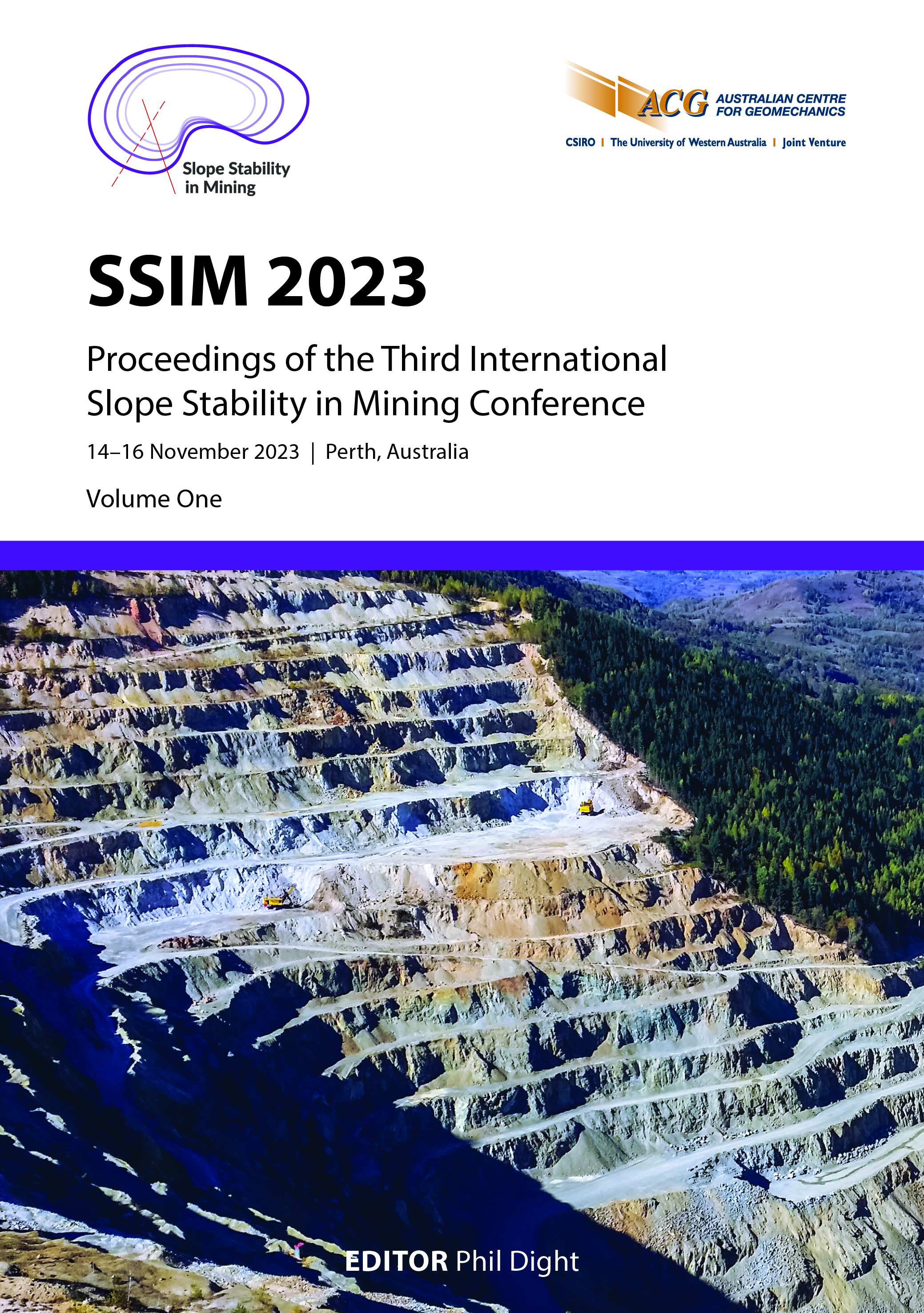Steepened open pit slopes can be stable: case studies of Gold Fields, Ghana

|
Authors: Seidu, M; Andrews, PG; Acheampong, C; Conduah, E |
DOI https://doi.org/10.36487/ACG_repo/2335_38
Cite As:
Seidu, M, Andrews, PG, Acheampong, C & Conduah, E 2023, 'Steepened open pit slopes can be stable: case studies of Gold Fields, Ghana', in PM Dight (ed.), SSIM 2023: Third International Slope Stability in Mining Conference, Australian Centre for Geomechanics, Perth, pp. 577-594, https://doi.org/10.36487/ACG_repo/2335_38
Abstract:
Gold Fields Ltd is a globally diversify gold producer with operations in Australia, Peru, Chile, South Africa and Ghana. The Tarkwa and Damang open pit mines are both in Ghana, and they produce a combined total of about 0.75 million ounces of gold annually. The global hunger for minerals, coupled with increasing mine depths and lower grade deposits, is driving mine designers and mine owners to reduce overall mining costs by optimising or steepening open pit slopes (Golestanifar & Akbari Dehkharghani 2018). This practice involves varying design parameters on portions of, or whole, slopes for obvious economic reasons. It has been shown that an increase in overall slope angle of 1° in a 500 m-high 50° wall results in a reduction of approximately 9,000 t of stripping per metre of face length (Stacey 2009). The mining practice of steepening open pit slopes has both economic and safety impacts on every mining project (Stacey 2009). The selection and implementation of the steepened slopes within the region (Gold Fields Ghana) was based on a solid understanding of the geology, critical structures (bedding/major structures), rock mass conditions, hydrogeological setting, operational capabilities and the historic performances of the slopes. In Tarkwa, steepening was done across all operational pits. The bench face angles were increased from 75 to 90°. This resulted in the increase of inter-ramp angle from 55 to 65°. At the Damang mine, the bench face angle of the slope on the west wall of the Damang pit cutback (DPCB) was steepened from 75 to 80°, resulting in a steepened inter-ramp angle from 59 to 63°. The successful implementation of steepening improved safety, increased the mining width at lower elevations and created opportunities of accessing more ore at depth. Gold Fields Ghana’s success with wall steepening was because onsite mining teams adhered to high drill and blast standards and mining controls. These, in combination with excellent wall cleaning practices, were fundamental for the safe and economically successful outcome. The purpose of this paper is to highlight the processes of steepening, share results and, ultimately, outline the best industry practices that led to successfully mining steeper slopes within Gold Fields Ghana.
Keywords: steepening, open pit slope, bench face angle
References:
Golestanifar, M & Akbari Dehkharghani, A 2018, ‘Governing risk elements through open pit slope optimization’, Journal of the Southern African Institute of Mining and Metallurgy, vol. 118, no. 1, pp. 47–55.
Goodman, RE & Shi, G-h 1985, Block Theory and Its Application to Rock Engineering, Prentice-Hall, Hoboken.
Hoek, E, Carranza-Torres, C & Corkum, B 2002, ‘Hoek–Brown failure criterion - 2002 edn’, Proceedings of NARMS-Tac Conference, Rocscience, Toronto, pp. 267–273.
Itasca 2018, 2D Numeric Modelling of Damang Open Pit, Itasca.
Stacey, P 2009, ‘Fundamentals of slope design’, Guidelines for Open Pit Slope Design, CSIRO Publishing, Collingwood, pp. 1–14.
© Copyright 2026, Australian Centre for Geomechanics (ACG), The University of Western Australia. All rights reserved.
View copyright/legal information
Please direct any queries or error reports to repository-acg@uwa.edu.au
View copyright/legal information
Please direct any queries or error reports to repository-acg@uwa.edu.au

